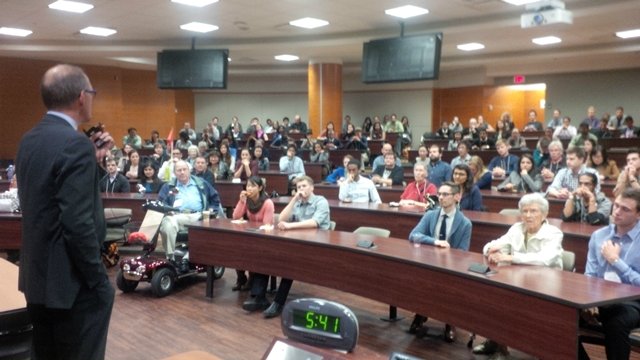
Fraser Brenneis, vice-dean of education, addresses volunteer patient mentors at the meet and greet event
Diane Lund didn't hesitate when she received a phone call asking if she and her family would be interested in becoming patient mentors for medical students. The answer was yes.
"Both my children have juvenile diabetes; they're teenagers and they're struggling," she says. "One of the things that we believe as a family is that there's always hope for tomorrow. This was a way for the kids to put their experiences into helping somebody else. It's their way to give back; so they can be a voice. I think if we can make something good out of something not so good, then we win a huge victory. I hope through this program that up and coming doctors will gain an empathy and understanding regarding the stress a family goes through."
Lund's two children, Kaleb, 14 and Alleyah, 13, are among the 83 people recruited by the Faculty of Medicine & Dentistry as patient mentors for the Patient Immersion Learning Experience program, a mandatory component of the new physicianship course for first-year medical students. The family attended a meet and greet event in the Katz atrium Monday night which allowed the class of 2017 to thank the patients for volunteering their time and their stories, and to meet the patients and their family members for the first time.
The new patient immersion program matches first-year medical students with patients who suffer from chronic illness. Students will complete three home visits with their patient mentors, and accompany them to one medical appointment. Patients were recruited through contact cards that were distributed to family physicians, primary care networks, pediatric and adult hospital clinics, the home living and continuing care department of Alberta Health Services, and support groups for patients with chronic illnesses. "Every patient is a person with a story," read the appeal on the card. "Share yours and help us improve how we care for patients."
"The purpose of this program is to be immersed in what it is like to be a patient living with chronic illness - the impact on the patient, the impact on the patient's life and identity, the impact on the family dynamics and the patient's support structure. It also exposes students to what a person with chronic illness has to deal with to navigate the health-care system," says Amy Tan, assistant professor in the Department of Family Medicine and director of the year 1 physicianship course. "It allows students to understand what it means to be a patient; it's a way for students to walk in their shoes."
The program was partly modelled on Arno Kumagai's Family Centered Experience program at the University of Michigan. Kumagai gave generously of his time in consultation to help create a similar program for the Faculty, but one that met the specific needs of U of A medical students. Tan hopes that the patients will be willing to forge relationships that continue into the students' second years. At the end of the second year, students will work with the Faculty's Arts & Humanities in Health and Medicine program to portray the insights they gained through this experience in art or creative writing.
"This program offers an important opportunity for our first-year medical students to come to understand the burden of chronic illness - the level of suffering and how much it impacts lives," says Fraser Brenneis, vice-dean of education with the Faculty of Medicine & Dentistry. "We hope it will give them a better sense of what the next 30 to 40 years of their lives will be like as they work with people who are ill - people with lives, with homes, with families, with responsibilities. As a family physician I've heard hundreds, thousands of stories. To give first-year students the opportunity to understand someone's story is important."
Tan developed the patient immersion program as a component of an integrated course focused on the development of the physician, part of the curriculum renewal initiative directed by Tracey Hillier, associate dean of MD curriculum and Kent Stobart, associate dean of undergraduate medical education. Existing courses were combined so that each component of a physician's training - how to communicate with patients, how to examine patients, how to deal with professional, legal, ethical and health equity issues, how to deal with the complexities of medicine - was rolled into one course.